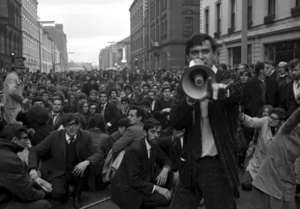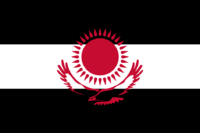Difference between revisions of "Portal:Gjorka"
| (One intermediate revision by the same user not shown) | |||
| Line 44: | Line 44: | ||
| 3=President of Gjorka | | 3=President of Gjorka | ||
| 4=Gjorkan National Armed Forces | | 4=Gjorkan National Armed Forces | ||
| − | | 5= | + | | 5=Black Revolution |
| 6=2022 Gjorka City summit | | 6=2022 Gjorka City summit | ||
| 7=National Assembly (Gjorka) | | 7=National Assembly (Gjorka) | ||
| Line 89: | Line 89: | ||
<div style="padding:1rem">{{Transclude random excerpt | <div style="padding:1rem">{{Transclude random excerpt | ||
| 1=Samuel MacMorrow | | 1=Samuel MacMorrow | ||
| − | | 2= | + | | 2=Andrew Tabor |
| 3=Carter Morris | | 3=Carter Morris | ||
| 4=High King Weelington | | 4=High King Weelington | ||
Latest revision as of 13:15, 13 February 2024
Dia dhuit! Fáilte go dtí Gjorka!

| |
Gjorka, officially the Federation of Gjorka, is a country located in southern Ostlandet. Gjorka borders the Almanople Sea to the East, Ajakanistan to the west, Zloveshchiy to the North, and New Gandor to the south. Gjorka is home to 70 million people as of 2020, making it the 11th most populated in the world and fifth most populated in Ostlandet. Gjorka's capital is located in Gjorka City while it's largest city is Nomakoa. Gjorka spans 910,789 square miles and consists of 11 districts.
Gjorka's gdp of ₵1.1 trillion credits makes it the 11th largest economy in the world, and it's GDP per capita of ₵53,016 credits make Gjorkans the 3rd wealthiest citizens by average. The currency of Gjorka is the pón. This economic growth was experienced following the fifty years of peace experienced following the fall of the military government and the end of the Gjorkan Resistance. Gjorka is a presidential republic headed by the President of Gjorka, Carter Morris, and balanced by a unicameral legislative branch, the National Assembly.
The First Kingdom of Gjorka was founded in 640 A.D following the union of the Kingdom of Jor and Kingdom of Gior. The First Kingdom was the first government to unify the whole of Gjorka and lasted until 725 A.D. The First Kingdom was succeeded by a Second and Third Kingdom. However, by the Third Kingdom the Monarchy had grown significantly corrupt and greedy. The ruiling monarch, Quintin III, tried to challenge the powerful Merchant class of Gjorka resulting in the First Gjorkan Civil War. Following the Merchant victory in the civil war, the First Gjorkan Republic was established and monarchism left Gjorka. The First Republic faced many challenges including the feuding between the ruling Merchant class and working Commoner class. Following the victory of a Pro-Commoner party in the 1850 election, the High Court of Gjorka banned the Commoners and dissolved the legislature. Eventually after 70 years of judicial tyranny and economic collapse resulted in the Second Gjorkan Civil War where Revolutionaries tried to overthrow the government. They succeeded resulting in the Second Gjorkan Republic, however the Revolutionary military had taken over the government resulting in a military dictatorship. Following a long resistance, the military dictatorship was dissolved in the Black Revolution and democracy restored to Gjorka with the Third Gjorkan Republic. However, this new republic was unstable and collapsed following the corrupt presidency of Rick Milhous. Thus leading to the founding of the current Federation of Gjorka.
- Gjorka and other nations of Ostlandet founded the Ostlandet Union at the 2022 Gjorka City summit
- The National Social Party left the opposition National Coalition following the 2022 Gjorka City summit
- Gjorka deployed the Cavalry Guard and locked down Gjorka's embassy row following the 5 June attacks
- Carter Morris was elected President of Gjorka following the 2021 Gjorkan presidential election with just 32.4% of the vote
- The Canton Spiders selected QB Anthony Reece first overall in the 2022 SPG Draft

Gjorkans protesting during the Black Revolution
- ...that Gjorka has the 3rd highest GDP per capita?
- ...that Gjorka used the Pón as it's official currency?
- ...that Gjorka overthrew their military government in 1972 in the Black Revolution?
- ...that Gjorka's first democratically elected President was Samuel MacMorrow in the 1972 Gjorkan presidential election?
- ...that Gjorka's largest minority group is Khoroshiyans?
- ...that the largest sport in Gjorka is Peil?
- ...that Gjorka has a national police force known as the Garda Gjorkan?
- ...that Gjorka's third largest city is Éire?
List of selected articles
|
|---|
The Gjorkan Resistance was an insurgency of various anti-government groups against the Military Dictatorship of Gjorka that lasted 53 years from November 11th 1919 to November 11th 1972. The insurgency began following the end of the Second Gjorkan Civil War, and the surrender of last remaining major socialist forces. Various socialist and loyalist groups throughout Gjorka however did not end their fight. The early phase of the Gjorkan Resistance is known as the War against Socialism as the Government hunted down the remaining opposition groups. However, the conflict expanded to a larger resistance movement following the government's decision to delay elections until further notice in 1923.
The resistance had various phases of conflict heating up, and cooling down. However, by 1971 the democratic resistance had gained significant public support, and Government efforts to supplants the rebel groups were starting to fail. This all came to a head with the death of President MacRoy, and subsequent 1971 Gjorkan coup d'état by Austin Tannerburg. However, Tannerbug's rule was not universally accepted and many other military units across the country mobilized to overthrow him. In order to have a fighting chance, Tannerburg publicly declared support for a restoration of Gjorkan Democracy, despite privately wanting to continue a dictatorship under his rule. Gjorkans flooded the street, in celebration of the news and military units across the Republic faced mass desertions. This event known as the Black Revolution caused a cease fire between most major rebel groups and the government, and the eventual return of Gjorkan democracy a year later on November 11th, 1973 (53 years to the day of the end of the Second Gjorkan Civil War) leading to the end of the resistance. Read more...

